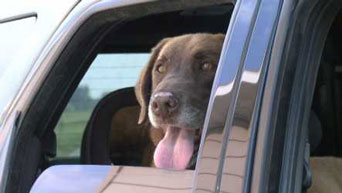May 21, 2018
Veterinarian offers summertime safety tips for your pets
Submitted by Communications and Marketing

Summer is almost here and along with the fun of the great outdoors can come potentially dangerous situations for your pet, according to a Kansas State University veterinarian.
Susan Nelson, clinical professor at the university's Veterinary Health Center, shares several safety tips to keep your pet healthy and happy during the summer months.
Nelson recommends that your furry friends get started on a flea, tick and heartworm preventative to protect against the buzz and bites of fleas, ticks and mosquitoes.
According to Nelson, ticks bring many tick-borne illnesses, such as Lyme disease, Ehrlichiosis and Rocky Mountain Spotted Fever for dogs, and a most often deadly disease for cats called cytauxzoonosis. Fleas can cause flea bite anemia, flea allergy dermatitis, plague, tapeworms and Bartonella Henslae, which is the cause of cat scratch fever in people. With mosquitoes comes heartworm disease for both dogs and cats, which is often fatal if left untreated, she said.
"Year-round protection against all these parasites is recommended and there are many choices available for both dogs and cats," Nelson said. "Many of the heartworm preventives deworm against several intestinal parasites as well, which are also more prevalent during warmer weather."
With an increase in time spent outside, Nelson recommends reintroducing dogs slowly to exercise if they have been less active over the winter months or they may succumb to injury. If you take your dog to the dog park, make sure they are current on recommended vaccinations for your area and review dog park etiquette prior to going, Nelson said.
"It is important to watch your dog closely when interacting with other dogs as play can often turn too 'ruff' at times," she said.
For owners who plan to travel with their pet, Nelson recommends protecting pets' eyes from injury by not allowing them to stick out their heads while driving. Keeping pets buckled up or secure in a crate also will help avoid injury should there be an accident and to keep them from getting under the foot of the driver, she said. Also, avoid having them ride in the bed of a pickup as many dogs have been known to jump out or be ejected out in the case of an accident.
When temperatures are high, it is important to remember to never leave your pet confined to the car as heat stroke is too often a fatal consequence, Nelson said.
Many people and dogs are drawn to water activities during the warmer months. As pools reopen for use, make sure they are properly gated to keep out curious pets — and children — and avoid accidental drownings, Nelson said.
Nelson suggests additional safety precautions if taking your dog boating or fishing.
"If you take your dog boating, make sure he wears a life jacket if he cannot swim or if you will be far from shore. Also ensure your dog is vaccinated against Leptospirosis, a potentially deadly disease caused by a type of bacteria often found in lakes, ponds and standing water," Nelson said. "While fishing, keep baited and unbaited hooks and lures out of reach as many dogs have been known to swallow them or have them get stuck up in a lip, both situations often ending up with a trip to the veterinarian."
Summer also means that plants will be blooming and people out working in their yards.
"Many plants are toxic to your pets, including Azaleas and Rhododendrons; and all parts of lilies, including the pollen, are toxic to cats," Nelson said. "Herbicides, fertilizers and insecticides should be kept out of reach from your pets and instructions for use and when pets can be allowed back onto the lawn should be followed."
Some mulches contain parts of the cocoa bean, which can be toxic to dogs if ingested, she said.
Pets also see their allergies peak during this season, Nelson said. This can lead to itchy skin, sneezing and watery eyes.
"Speak with your veterinarian about options, as there are many new products that can help your pet combat seasonal allergies," Nelson said.
Grass also produces grass seeds, or awns, which often get caught up in the coat, ear canals or between the toes, and can migrate a great distance in the body and cause serious infections. Nelson recommends checking your dog's body and feet daily for these annoying, and possibly deadly, pieces of plant material.
This time of the year also brings with it an increased chance for severe weather with thunder, which is particularly traumatic for many dogs. Nelson said there are several nonprescription options to treat mild anxiety caused by thunder and other loud noises, but if your dog has severe phobias, speak to your veterinarian about prescription medications to help alleviate your pet's anxiety.
Finally, make sure your pet is properly identified with a tag and collar and a microchip to ensure, if lost, they will be returned to you. Even if your pet is kept indoors or not prone to wandering, Nelson said proper identification is always a good idea as there are many reasons why a pet can become lost or displaced.
For more information, contact the Veterinary Health Center at 785-532-5690.
